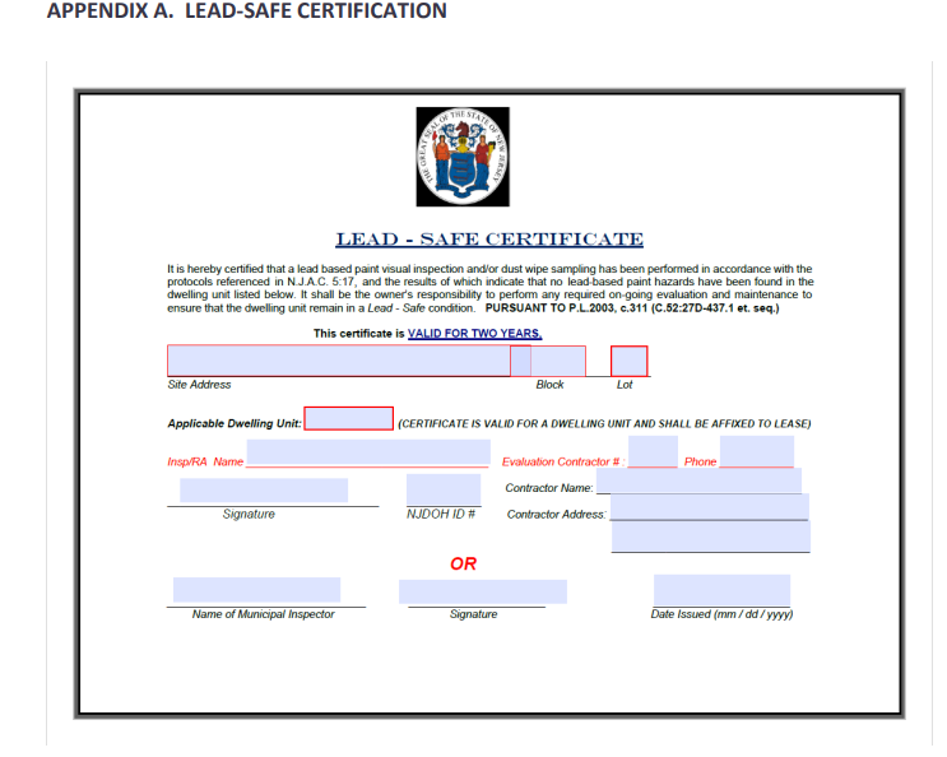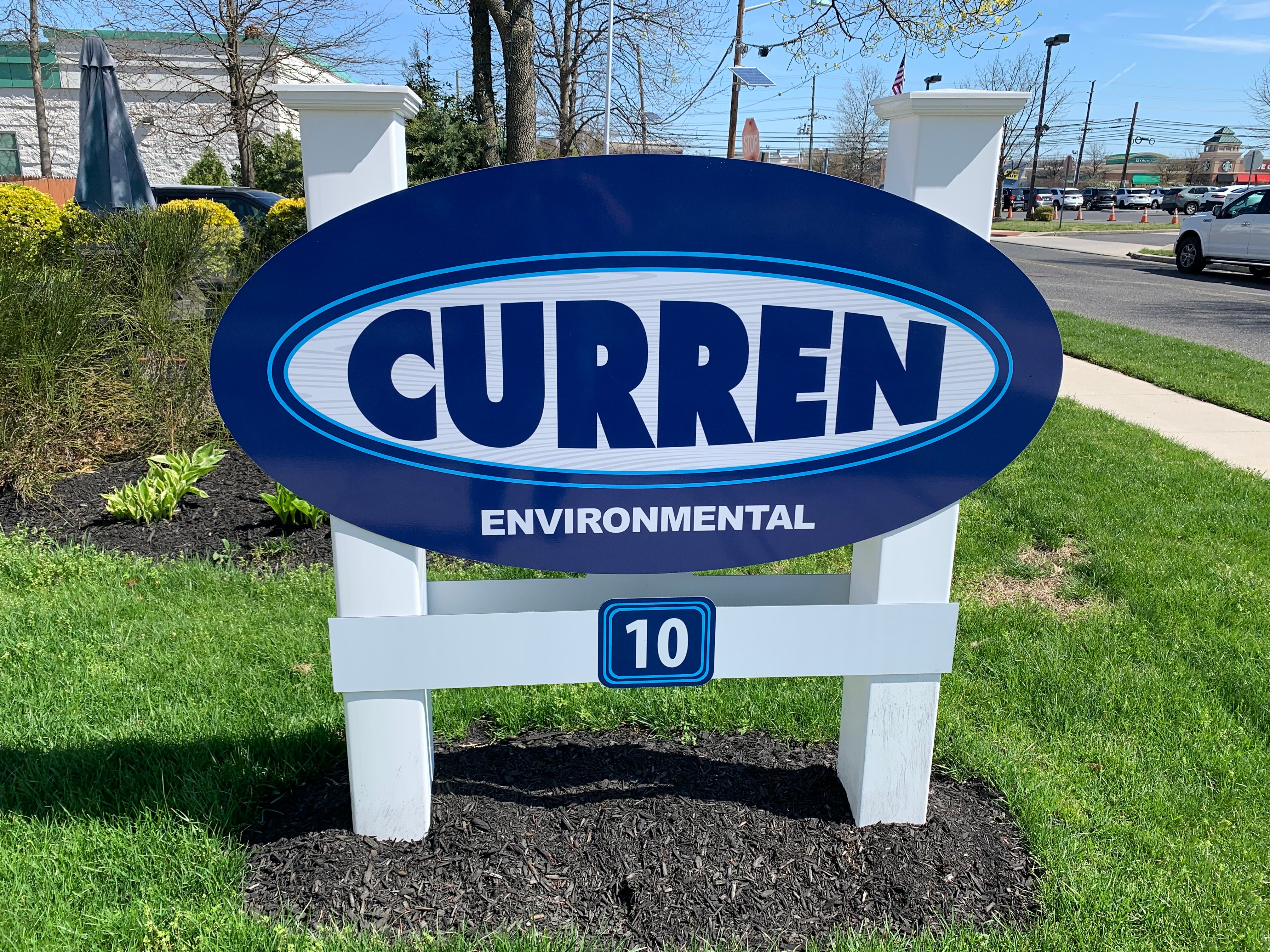Preparing for a lead paint Inspection
Areas to look for prior to the inspection
All rooms in the dwelling unit should be visually inspected for deteriorated paint conditions (peeling, chipping or cracking, etc.) including laundry areas, basements and attics, when access to those areas is directly from within the dwelling unit.
All painted, varnished or poly coated areas within the dwelling unit must be intact and not peeling, chipping or cracking. This includes but is not limited to baseboards, doors and door frames, walls, ceilings, enclosed porches, painted cabinets, radiators, window jambs /frames, sills, wells and both sides of the sashes.
Free Consultation
856-858-9509
Preparing for a lead paint inspection
When getting a lead inspection, ensure all paint is intact. There should be no peeling, chipping, cracking, or flaking paint. This includes paint you know does not contain lead.










How would a property fail a Lead Safe Inspection?
If the unit does not look freshly painted, it would fail. Most people read this as I have to Repaint the Entire Unit! That is wrong, most properties need maybe 60 brush strokes, to top dress surfaces.

Let's be real if you are a landlord, your own house would likely fail an inspection because the inspection requirements are based on EPA and HUD guidelines from the 1990's and they have not been updated. The only thing that has changed is the passing standard for lead dust is much lower.
As of July 22, 2022, Lead paint in long term rental properties (6 months or longer) which were built before 1978 are subject to a new law which is being referred as, New Jersey’s Lead Safe Certification.
The basis of the law is applicable properties (read long term rentals built before 1978) will be required to have lead paint risk assessments performed.
100% of the rental properties require this visual lead risk assessment. The visual assessment is just that, a licensed New Jersey Department of Health Lead Paint Inspector/Risk Assessor visually inspecting indoor components deteriorated paint. Deteriorated paint is just as it sounds, paint that is chipping, peeling, flaking, you know deteriorated.
What does this Lead Safe Certification law require of a property owner?
If you rent a pre-1978 property (Lead paint was banned in 1978) that does not qualify for one of the exemptions, beginning July 2022, you are required to have an inspection performed. The timing of the inspection is as follows:
At tenant turnover or
within 2 years of the law (July 2022)
After the initial inspection the law will require property owners to continually re-certify prior Lead Safe units are still Lead safe by having a reinspection for Lead-Safe at either turnover or every three years (whichever comes first) and Lead Safe Certifications are only valid for 2 years.

Pro Tip
The above Lead Safe Certification is required to be attached to the lease. So now your tenant is aware they are living in a lead safe environment.
Who can perform the Lead inspection?
Lead inspections can only be done by
-
Municipal local agency inspection program. In short, a municipality may have a lead inspector or defer to one from the County, if the County has one.
-
By an NJ DCA certified Lead Evaluation contractor hired by the municipality.
-
The property owner can hire directly a NJ DCA Certified Lead Evaluation contractor to provide the Lead inspection.
Free Consultation
888-301-1050
What are the requirements of property owners under P.L. 2021, c. 182?
If lead-based paint hazards are identified, then the owner of the dwelling shall remediate the hazards through abatement or lead-based paint hazard control mechanisms. Property owners must also report all tenant turnover activity to the municipality. Lastly, property owners must provide a copy of N.J.A.C. 5:28A, any lead-safe certifications, and the accompanying guidance document, Lead-Based Paint in Rental Dwellings, to any prospective owners of the dwelling during the real estate transaction, settlement, or closing.
What Does the Landlord do with the Lead Safe Certification?
Landlords are required to provide copies of all Lead Safe Certifications (per unit) and leases to the DCA inspector during their 5-year multiple dwelling inspection. Property owners will be required to provide copies of a current or newly issued Lead Safe Certificate to new residents specific for the unit they will be renting as part of the lease documents. If a resident resides within the unit during the Re-Lead Safe Certification renewal cycle (3 year) the resident must sign a copy of the Lead Safe Certification and such documentation must be maintained
Failure to comply with NJ Lead Safe Certification requirements can incur fines of up to $1000 per unit per week.
What properties are exempt from Lead Inspections?
- Properties that have been certified to be free of lead-based paint.
- Properties constructed during or after 1978.
- Rental units in a multiple dwelling that have been registered with the DCA as a multiple dwelling for at least 10 years, either under the current or a previous owner, and has no outstanding lead violations from the most recent cyclical inspection performed on the multiple dwelling under the “Hotel and Multiple Dwelling Law.
- Single-family or two-family seasonal rental dwelling which is rented for less than 6 months duration each year by tenants that do not have consecutive lease renewals.
- Properties that already have a valid lead-safe certification issued in accordance with this section.
Pro Tip
If you have not tested for lead-based paint and the property is pre-1978 original construction, the law states you must assume it is lead-based paint, which can be an expensive and costly lack of knowledge. The safe approach is to test for Lead and then know if or where it exists and then how to manage the risk.
Call the Experts
888-301-1050

